#The siege of enlightenment
Text
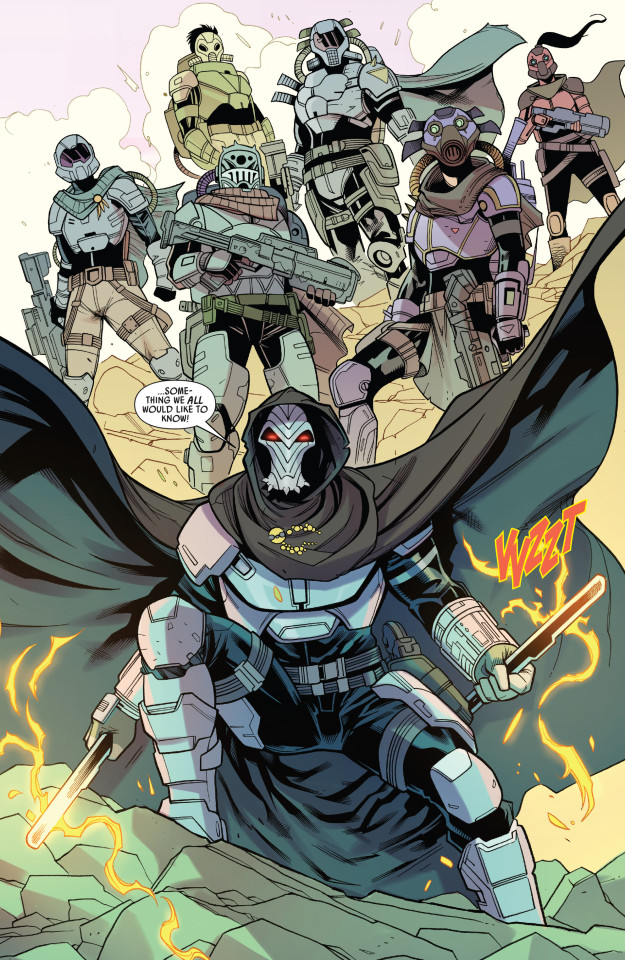
Star Wars: High Republic #7 (2023)
Battle for the forcé
Chapter two: The siege of enlightenment
Marvel
#Star Wars High Republic#Star Wars#High Republic#The siege of enlightenment#comics#comic books#comic covers#scifi#sci-fi#science fiction#Cavan Scott#andrea broccardo#Marika Cresta#mark morales#Frank William
3 notes
·
View notes
Text
uncle iroh is treated very much like a paragon of virtue in the series. yes we know he has had a violent past, that he has done terrible things, committed atrocities in the service of the fire nation— but we don’t really feel it because all of that had happened off screen and prior to the series. instead, he comes to us as a more perfect being and one deified with secret good deeds revealed throughout the story: uncle iroh is the keeper of the dragons and an important member of the white lotus, he is just that awesome.
uncle iroh is so divorced from his immediate past that we don’t see him haunted by any of it unless it’s by lu ten— which begs the question: did he really turn his back on the fire nation due to a moral awakening or was it only/mostly for his own good? he certainly doesn’t behave in a manner you’d expect from a repentant ex-imperialist: he’s not too worried about walking the streets of ba singe se, let alone actually staying there after the war ended. (the same war he participated in on the side of the aggressors, mind you.) he is shameless enough to be living there while hiding away and was unscrupulous in accepting hospitality from earth kingdom folks who were made refugees by the fire nation, i.e., song’s family. does he not feel guilty or at least uncomfortable with his circumstances, especially since it has only been 5 or so years since the siege at ba sing se and thus still very fresh in the grand scheme of things? is iroh just that Enlightened and At Peace with his past that it doesn’t color his every movement? or is his lack of a moral hangover just a writing oversight? were they scared to make their most lovable character in a rated TV-Y7 cartoon a tad more polarizing?
while uncle iroh does his job well for the story— that is, to act as zuko’s guiding light— i do wish he were knocked off his pedestal a bit more. uncle iroh is, after all, the proto-zuko to ozai’s proto-azula. i wish to see him at least slightly paranoid about people recognizing him from his military days and vice versa. i wish to see him uneasy about being in the earth kingdom (out of guilt? as opposed to zuko’s superiority complex and anger). i wish to see him meet another person who also has visible burn scars, one that has nothing to do with zuko/his family, and still look away in shame or disgust by the implications. et cetera et cetera. anything to indicate he feels something more about himself and other people that isn’t just Wise Old Man.
665 notes
·
View notes
Text
I think the essence of what drives me crazy about current Enlightened Online Leftist Discourse Regarding My Life Personally And Whether This Time Killing Me Is Morally Correct (as in, commentary about the latest episode in i/p violence) is this:
I want a free Palestine.
I don't personally know a lot of people that don't! They might bristle at the tagline, because it's co-opted by people who do in fact want them dead, but as soon as I lay out why it's in literally everyone's best interest, how a non-free Palestine is horrific both to the people of Israel and to the people of Palestine, how pragmatically ridiculous the occupation of the west bank and the siege upon Gaza are (and I am a very pragmatic person), they get it. And I don't mean I debate people online about it - this, too, is a ridiculous concept - I mean having, time and time again, the deradicalization conversation with my friends, and colleagues, and my family. Obviously not only now - I've always been a very principled and argumentative Jew, ever since I became an adult - and I've been alive for, I don't know, a dozen flashpoints and operations and wars at this point, and I don't stop being argumentative and loud in peacetime either, but especially now.
But that's not what "from the river to the sea" means.
When you, gentle soul from across the sea, echo this slogan, you are either:
By apathy or will, ignoring that the sentiment cheers for the mass expulsion and killing of Jews. Indeed, any non-Muslim present from the river to the sea. This doesn't even begin to cover how even Muslim arabs still will not be safe under Hamas rule - and trust me, I don't care if a Hamas apologist told you different. A victory for Hamas (And we're ignoring the fact they do not have the military capacity for it - I hope you are aware of the privilege inherent to not understanding military conflicts) means exactly that. No "rule by the people". No socialistic, Palestinian utopia to be had, which is a fantasy I'm seeing alluded to a lot recently. Just an extension of the horrific power structure in Lebanon and Syria, where Hezbollah - friends and allies to Hamas - have been playing a tango for decades of both refusing to participate in actual government and betterment of civilian lives, while still draining their resources and controlling them with no real contest. "From the river to the sea" is not a sentiment for freedom fighting - it's a sentiment for a final solution to the people living here who are either Jewish, or for some Very Strange And Weird Reason would rather not submit to Hamas rule. You know - Israeli Arabs, secular and Muslim and Christian, Druze, Circassians, Bahai, take your pick. Their suffering, and my suffering - you know, a person who made the strategic error of being born in Israel while Jewish, which is inherently problematic and not okay of me - don't matter to you. Just the fantasy of an easy, morally correct cleanse of the land.
Are well aware of all of the above! You just don't care. You either smugly chuckle that I, and anybody else who will die, deserve it - or that it's an acceptable loss for the aforementioned fantasy. "Decolonization is an inherently violent process", you'll say to me, chillingly, before implying I have a summer home in Brooklyn I can just retreat to when things get tough. Israel is basically Rhodesia, a very popular blog here mentioned flippantly, so what's the issue with all of those lily-white Jews fucking off back home before the righteous freedom fighters strike them down? Well. This might be the part I urge you to open a book, or even Wikipedia or any god damn thing that will explain to you these upsetting, dense things you clearly struggle with.
So finally:
It's easy for me to discount islamophobes. Like, very easy. It's very easy for me to discount insane evangelistics who "advocate for me" simply because I'm a pawn in their religious rapture. It's easy for me to fight against Israeli and Jewish fascists - I have been long before this news item came across your feed, as did the insinuations that some civilian deaths are okay, actually.
It's easy for me for me to see promotions for donations to non-political aid in Gaza. It's easy for me to see the sentiment that hey! Palestinians deserve safe, healthy lives. That they have deserved an independent state, and were unfairly denied one, for decades. It's easy for me to see people saying "You know, the Israeli government is shit, actually, and their actions endanger and promote to the misery of innocents". Because that's right! I wouldn't be voting and protesting and donating for all of these sentiments otherwise!
It's not easy for me to see people, who I honestly held in high regard and saw having well thought out opinions on important matters, inadvertently echo the sentiment that my death is acceptable. That a terrorist organization, who rule over their own territory with fear and violence, are righteous freedom fighters, vox populi, only out to establish a free state. Like hey, their manifesto said otherwise, so it must be all there is - right? That Jews are just hysterical, they can easily live elsewhere - ever since that nasty holocaust business everything's fine abroad. Besides, it was just so long ago who even cares stop talking about it. Hamas, Hezbollah, ISIS, the Ayatollahs in Iran, the fucking Islamic Jihad - are not interested in freedom. They aren't, and echoing their slogan tells me you are either ignoring that, or support them anyway. If antisemitic rhetoric, half truths and lies by omission work on you today, they would have in any period of time. I'm sorry this makes you uncomfortable. I'm not, not really.
Know what your fucking words mean. Have a cursory glance at the history of the MENA and why it's so fucked, one that doesn't boil down to "The Jews, with American help, rolled into where they don't belong". This isn't even a joke. I've seen this braindead, history-revising sentiment repeated so many times, both online and in actual textbooks, that I feel I'm going insane. So many well-meaning people handwringing and assuring each other that repeating genocidal slogans is fine, that calling the i/p conflict "a simple problem" (which means it has a simple solution, right? Just kill the Jews.) is a well-adjusted and intellectual take. That "only the Zionists should die! The rest will be fine :)" I dare you to say that and also give me a correct definition of what Zionism is. Why I, a Jew that advocates for Palestinian statehood and rights and safety and always have, won't also face the wall in your little fantasy.
Freedom to Palestine. Peace in the middle east, fucking yesterday.
A curse and a plague on those who don't want either of those, and just want to cheer on the death of "the other side".
A curse and a plague upon you, when you tell me, smugly, from somewhere safe and far away, "from the river to the sea".
#selfpost#long post#i/p#israel#palestine#antisemitism#antizionism#I pondered linking every word of every claim I make to sources like Reuters and Wikipedia and what have you#but honestly? Please just read them#don't get your news off fucking Twitter#my respect for “critical thinking” online leftists is already at an all time low
1K notes
·
View notes
Note
What the hell is wrong with this man WTF
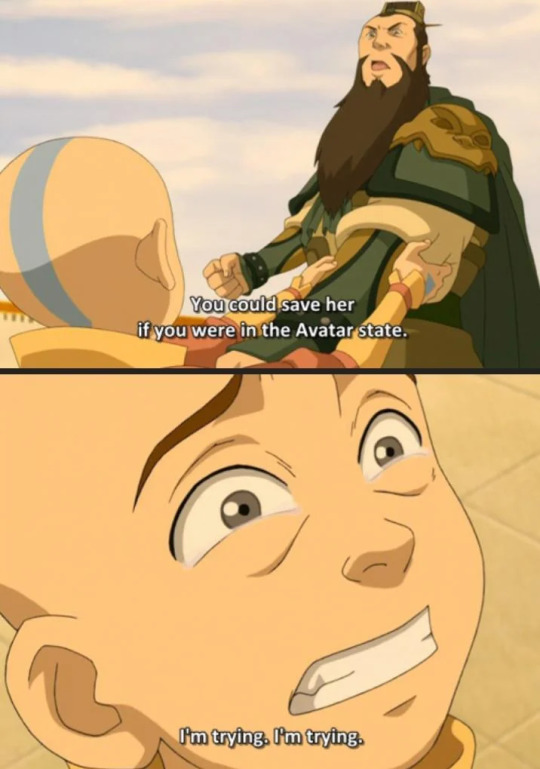
He's a very realistic character actually, but damn
general fong is great because he’s our first proper introduction of aang’s central quandary of whether it’s more important to choose power or love, to choose being the avatar or being an air nomad. in “the siege of the north” aang’s full capacity for divine vengeance and destruction is revealed to us, and we see that he could easily kill the firelord if he tapped into that power. and by the time he does fight ozai, the struggle isn’t whether or not he can beat him in a fight (it isn’t even a question), but whether he can hold back enough not to kill him. general fong is a more exaggerated caricature of people like sokka and zuko who pressure aang into killing ozai; or guru pathik, who wants aang to let go of his earthly attachments to attain cosmic power; or the avatars who tell him that being the avatar means giving up any one cultural value for the sake of the world. aang cannot enter the avatar state in this way, because it would be ethically and thematically wrong. aang needs to reach a place of enlightenment, true enlightenment, through his own cultural values, if he wants to end the war in a way that actually means something. and he cannot do that by force or through rage, by attempting to cut out pieces of himself or by sacrificing the values of his people. aang needs to be able to prove that his people did have a place in this world, and he cannot do that by discarding those values when it suits him. that is what makes him so uniquely fit to be the avatar: because he’s not just ridiculously powerful (even for avatar standards), but because he’s an air nomad through and through.
#elena—89#asks#analysis#aang#general fong#I love him so much…#(aang. not fong. lol)#altho in that pic he does lowkey look like elmer fudd#moments after being walloped in the nuts with an anvil by bugs bunny
291 notes
·
View notes
Text
I want to talk more about the way the characters have been adapted for the live action adaptation, because character writing is the thing I care about the most and as a psychologist it's probably the aspect of any story that I'm most invested in. I can get around pretty much any plot contrivance or weird maguffin or even shitty pacing if the characters of a story are engaging enough. This is my bread and butter, so to speak.
And I want to start with Iroh, because I think he is by far the best adapted character from the original. But I suspect I think this for different reasons than other people might, because the beloved Saint Iroh from the animated show this man is not.
See the thing with animated Iroh is that he's just...a bit too perfect. We know he's been complicit in the war in the past. We know he laid siege to Ba Sing Se, we know he had a complicated past. But we never really see it, we only barely hear about it, and more often than not there are other aspects of Iroh's past that serve to further deify him. He was a general in the war, but then he goes on to protect the last dragons and learn the true meaning of firebending. He led a 600-day siege and lost his son but he came out of that experience Enlightened, having journeyed to and from the spirit world. He joins up with the White Lotus (at some point) and becomes the wise old sage we know and love.
Except most of that is revealed in later seasons and is inconsistent with his actions alongside Zuko in season one. Season one animated Iroh is kind of a passive character, largely existing for comic relief and as a support to Zuko. But there's very little to suggest he's disloyal to the Fire Nation or their cause. He says it himself- "I'm no traitor, Zhao!" Now you can certainly interpret that line in several different ways, but I suppose that's the point- there's a lot left up to interpretation with animated Iroh. We get a sense of who he is in relation to Zuko, but his own development largely happens off-screen. And because to Zuko he's a wise, caring uncle and mentor, that's largely how we, the audience, see Iroh. We love him because Zuko loves him. And that's fine for what it is, and clearly it was effective- Uncle Iroh is almost universally beloved. But it does leave a lot of questions about him up in the air.
Live action Iroh is a very different character. This Iroh is a deeply broken man who was been profoundly impacted by the war and what he has lost because of it. I do not get the sense that the loss of Lu Ten has led to any spiritual enlightenment for this Iroh- there's no indication that he can see spirits, for example, or that he has ever traveled to the spirit world himself (he does still oppose the killing the moon thing, though.)
Right out the gate, we get the sense that this Iroh has lost faith in what the Fire Nation is trying to achieve with the war. He explains to Aang fairly early on what the Fire Nation's goal and perspective is, and can rattle off this dogma quite easily. But when questioned by Aang if these beliefs are also his beliefs, he dodges them rather un-deftly. So you know immediately that this Iroh doesn't really support the war. Later you see him somewhat bluntly telling Zuko that the throne may not be all it's cracked up to be, and he's fairly openly critical of Ozai in other moments. So you know from the jump that Iroh's not really on Team Fire Nation.
And yet this is also not a truly repentant man. When he is captured in Omashu, Iroh gets another brief scene with Aang while they are both imprisoned there (this is before Aang meets with Bumi). And in this scene, Aang tries to convince Iroh to help Zuko stop being The Bad Guy. And Iroh defends Zuko to Aang and stresses the point that it is not Zuko who owes him any great debt, but he who owes Zuko. Later, when he is confronted (and hit several times) by an Earth Kingdom soldier who lost his brother during the siege, Iroh does not apologize. He does not flinch at the man's accusations, nor does he deny them. He defends himself, albeit weakly, by stating he was a soldier, and it was a war. He has the audacity to accuse this soldier (somewhat obliquely) of having been made dishonorable by the effects of war. It's kinda messed up, honestly.
But then this man accuses Iroh of knowing nothing of loss. He leaves the shot, and we saw Iroh's face just crumble, and the scene cuts directly to Lu Ten's funeral, where Zuko chooses to sit with his uncle and support him through what must have been the darkest moment of his life. Back in the present, it is only later, after Zuko has come to rescue Iroh, that he speaks more honestly to the Earth Kingdom soldier- he shows mercy and states that they've all "seen enough death."
So what we have here is an Iroh who is deeply disenchanted by the war and does not support it or the goals of the Fire Nation, but who has continued to stand alongside Zuko and support him in his goals. We have a man who doesn't necessarily regret his actions as a soldier in the war but who very much does regret what those actions have cost. We see a man who is profoundly impacted by loss and grief and has become emotionally reliant on his nephew as a source of support. Not that he's parentifying Zuko or anything, he's very much not, but he is rather obviously channeling all the love he once felt for his son into Zuko instead. Zuko is his lifeline, he needs Zuko and you get the sense that without him, Iroh would truly fall apart. I mean the man is on the verge of tears more often than not when Zuko is in even the slightest bit of danger in a way that animated Iroh was not.
This is what I think is different here. Animated Iroh seemed to turn against the war because it was morally wrong, it had thrown the world out of balance, and imperialism is bad. Live action Iroh seems against the war because it wasn't worth it. It wasn't worth the cost, or the death, or the grief. He couldn't see that until he lost Lu Ten, but now he sees it everywhere. I get the sense that this Iroh just wants it all to stop, and I'm not sure he cares how that happens.
The White Lotus is definitely hinted at, but I suspect that was his motivation for joining it. It's not about restoring balance to the world for this Iroh. It's about restoring peace, so that he won't have to lose Zuko like he lost Lu Ten. So that the death and destruction stops. So he can just live a quiet life and put the past behind him.
It's a different take. And it's not that he doesn't still have a lot of wisdom to him, that he's not still a gentle, caring person. But he's a much sadder person, and he's lost that sense of "enlightenment" that his animated counterpart had. There's a selfishness you can read into to this version of his character that's much more apparent than the animated version.
I think a lot of people are gonna hate this, because it's a darker take on a much loved character. But I love it. This Iroh is human, this Iroh is flawed, and this Iroh has a lot more growing left to do. And that's awesome. If we get to actually see more of a character arc for him too, if we get to see him also growing and changing alongside Zuko? Please. It's not like he needs a total redemption arc, per se, but if in his journey with Zuko throughout the Earth Kingdom we can see Iroh gain some of his fortitude back, we can see when he decides he needs to push Zuko down a certain path, to take a side in the war, to see that it's not just the death and destruction that makes it wrong? God there's so much potential with that.
Now, maybe this isn't what will happen with seasons two and three. Maybe they'll back track and try to make him more similar to the animated version. I don't know. But for now? Live action Iroh is fantastic, and Paul Sun-Hyung Lee is giving a hell of a performance. He's warm and tender when he needs to be, fierce when he has to, and just profoundly sad throughout it all. And I love him so much more for that.
I'll be controversial here and say it. So far, live action Iroh is a better character than animated Iroh.
#I never disliked animated Iroh to be clear but perfect can be boring#this Iroh is not perfect and that is so much more interesting to me#natla spoilers#natla#iroh
190 notes
·
View notes
Text
Normalization is an English translation of the Arabic word tatbi’, making something abnormal appear normal. As stated before by PACBI:
It is helpful to think of normalization as a “colonization of the mind,” whereby the oppressed subject comes to believe that the oppressor’s reality is the only “normal” reality that must be subscribed to, and that the oppression is a fact of life that must be coped with. Those who engage in normalization either ignore this oppression, or accept it as the status quo that can be lived with. In an attempt to whitewash its violations of international law and human rights, Israel attempts to re-brand itself, or present itself as normal -- even “enlightened” -- through an intricate array of relations and activities encompassing hi-tech, cultural, legal, LGBT and other realms. [3]
Another aspect of normalization is the attempt to use Palestinians and/or Arabs as “fig leaves” [4]. In the context of applying the BDS movement’s guidelines for the international academic and cultural boycott of Israel, PACBI sometimes faces scenarios where boycott bashers attempt to redeem their conscience, and with it some moral ground, by using token Palestinians (or more rarely other Arabs) as a fig leaf to cover up their complicity in Israel’s violations of international law and Palestinian rights. While the pool of available “fig leaves” is diminishing every year, thanks to the recent impressive spread of BDS consciousness among Palestinians and in the Arab world, there are still those who are ready to accept for their names to be manipulated in the cynical political agendas of international boycott violators.
From the above, one can see that normalization applies to relationships that convey a misleading or deceptive image of normalcy, of symmetry, of parity, for a patently abnormal and asymmetric relationship of colonial oppression and apartheid [5].
[...]
BDS is not about saving Israel as an apartheid state, giving up some occupied lands that are densely populated by Palestinians to make Israel a more pure apartheid, and to prolong the life of this apartheid for several more years. BDS is all about achieving Palestinian rights, paramount among which is the inalienable right to self determination, by ending Israel’s three-tiered system of colonial and racial oppression: colonialism, occupation and apartheid.
Of course, PACBI and the BDS National Committee (BNC) advocate a complete boycott until Israel ends its three tiered system of oppression, not simply its occupation of the West Bank and Gaza. The main reason for this position is that, according to international law, Israel, as the Occupying Power, bears responsibility for the occupation and all its manifestations (colonies, wall, siege, house demolitions, etc.), not to mention the other grave violations of international law outside the realm of occupation, such as forcible displacement, denial of refugee rights, and the crime of apartheid (which an increasing number of legal scholars is now convinced Israel is guilty of). The BDS movement calls for boycotting Israel as the state responsible for denying Palestinian rights, just as South Africa was the target of boycott due to its apartheid regime, and China is the target of some boycotts due to its occupation of Tibet, and Sudan is the target of some boycotts due to its crimes in Darfur. Only in Israel's case do we hear objections to boycotting the state that is responsible for egregious violations of international law, and do we hear suggestions instead to boycott only some manifestation of these violations (settlements), not the root cause.
170 notes
·
View notes
Text
Nancy Drew: Curse of Blackmoor Manor
I fell down a bit of a heraldry rabbit hole recently and decided to spend several hours compiling info about the Penvellyn family off the wiki and then used online heraldry resources to analyze their individual coat of arms. Did the game devs intend the shields to be interpreted this way? Probably not. But if I dont over-analyze 20 year old childrens computer games what else am I going to do with my life??
Here are all the people whose portraits hang in the great hall along with info we learn about them from Jane (and occasionally Nigel), their coat of arms, and my amateur interpretation of the symbolism.
Randulf ( - 1401)

“Randulf the Red, so named for his bright red hair, was considered a hero at the Battle of Poitiers. For his heroism, King Edward III awarded him with the lands in the region called "Penvellyn". That's how we got our name.”
Randulf's coat of arms says "IN HOC SIGNO" which translates to "in this sign (you will conquer)"
Comet; unknown in heraldry but refers to the family treasure
Red; Military might, warrior.
(putting the rest under the cut to save you much scrolling)
Odo (1354 – 1404)
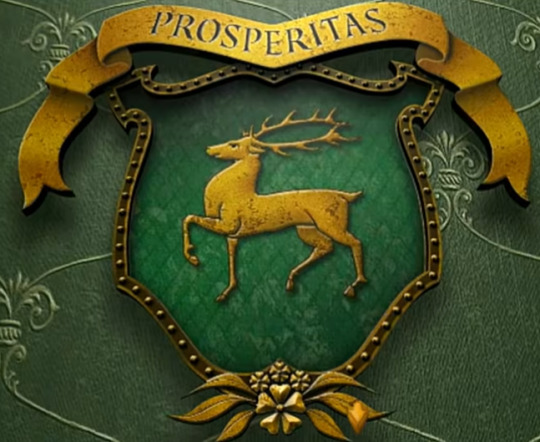
“Yeah, he isn't very exciting, really. Liked farming and cows. His son Milo is much more interesting.”
“Those Manuscripts are very old and brittle. They date back to the 14th century. Odo Penvellyn collected most of them. His father Randulf and son Milo were rather more interested in military victories than in book collecting.”
Odo's coat of arms says "PROSPERITAS" which translates to "success".
Milo (1376 – 1423)
Green; Hope, joy, loyalty
Deer/hart; One who will not fight unless provoked, peace and harmony
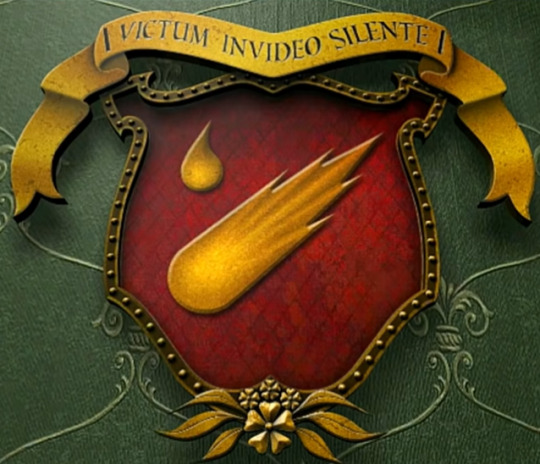
“Milo inherited not only his grandfather's red hair but his military prowess. Milo was instrumental in the Siege of Caen and was awarded even more lands by Henry V.”
Milo's coat of arms says "VICTUM INVIDEO SILENTE" which translates to "the conquered shall envy the dead".
Hugo (1401 – 1466)
Comet; unknown in heraldry
Red; Military might, warrior
Teardrop; “One who has endured torrents”
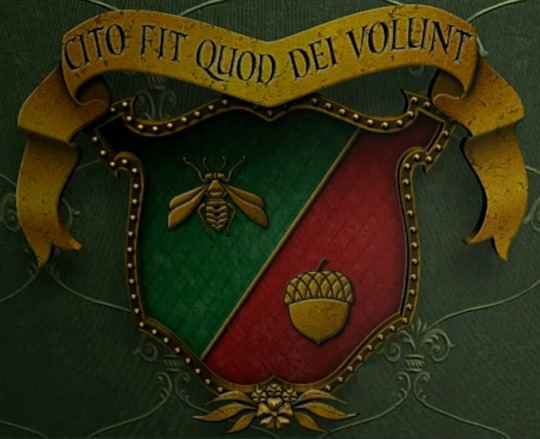
“Um, he had a lot of kids, and his dates were 1401 to 1466.”
Hugo's coat of arms says "CITO FIT QUOD DEI VOLUNT" which translates to "what the gods want happens soon".
Albert (1427 – 1508)
Bee; Industrious, diligent
Acorn; Antiquity, strength
Red; Military might, warrior
Green; Hope, joy, loyalty

“He was very mysterious and the people of Blackmoor were afraid of him because he knew all these scientific things. No one knows much about him, though.”
Albert's coat of arms says "TIMENDI CAUSA EST NESCIRE" which translates to "ignorance is the cause of fear".
Edmund (1447 – 1499)
Book (open); Manifestation, knowledge
Blue; Truth, loyalty
Green; Hope, joy, loyalty
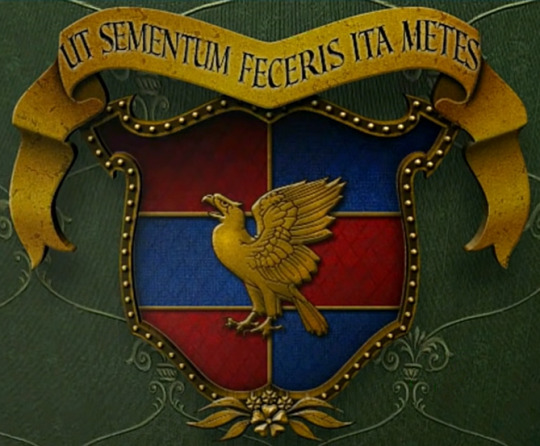
“He was into cows. He did a lot of breeding of cows and sheep and got some kind of award from the King.”
Edmund's coat of arms says "UT SEMENTUM FECERIS ITA METES" which translates to "As you sow, so shall you reap".
Charles (1478 – 1553)
Hawk (Falcon): One who does not rest until objective achieved, purpose, goal-oriented
Red; Military might, warrior
Blue; Truth, loyalty

"Ooh, ooh - Charles was a very famous judge and wrote very important books on law. But his boy, Garrett, drowned when he was really young.”
Charles's coat of arms says "MINIMA MAXIMA SUNT" which translates to "The smallest things are the most important".
Thomas (1526 – 1584)
Rainbow; Good times after bad
Moon; Serene power over the mundane
Sun; Creativity and enlightenment
Blue; Truth, loyalty
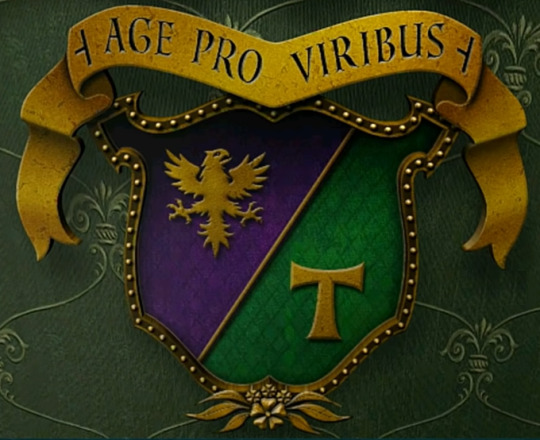
“He was Charles's grandson and wrote a lot of poetry. He also had 3 wives: Catherine, Anne, and Mary. But not like at the same time. They died and he just remarried.”
Thomas's coat of arms says "AGE PRO VIRIBUS" which translates to "in all that you do, do your best".
James (1560 – 1650)
Eagle (2 heads); Joining 2 strong forces
Purple; Nobility and justice
Green; Hope, joy, loyalty
T is presumably for Thomas, no heraldic meaning
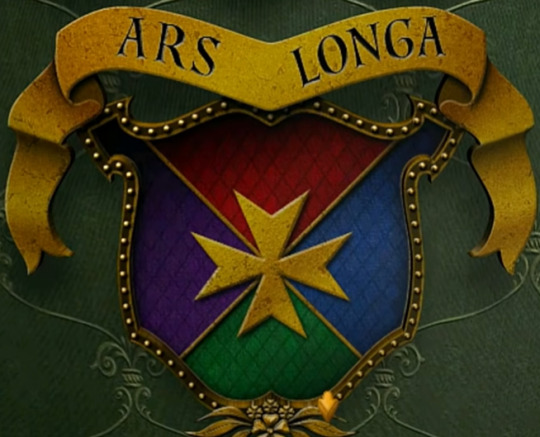
“He never married but one day, when he was very old, a baby was found on the doorstep to the manor. He took her in and raised her as his own. That was Elinor.”
James's coat of arms says "ARS LONGA" which translates to "art lives long" (from the phrase, ars longa vita brevis - art is long, life is short).
Elinor (1626 – 1650)
Maltese cross; Blessings, protection
Red; Military might, warrior
Green; Hope, joy, loyalty
Blue; Truth, loyalty
Purple; Nobility and justice
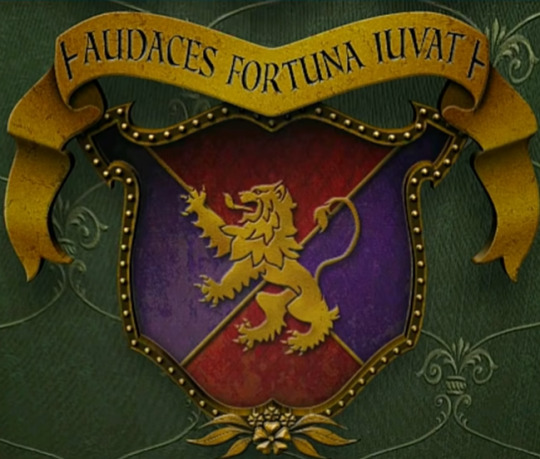
“Just that she was burned as a witch but it wasn't true and her father, James, died when he saw her die and then the family fled to France. I don't want to talk about this.”
Elinor's coat of arms says "AUDACES FORTUNA IUVAT" which translates to "fortune favors the bold".
Corbin (1670 – 1741)
Lion rampant; Courage, integrity, strength
Red; Military might, warrior
Purple; Nobility and justice
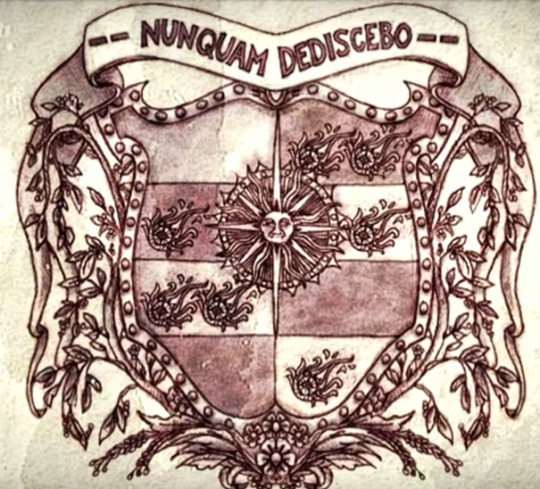
“Uh…I dunno. He doesn't have a coat of arms in the Great Hall because he didn't live here; wasn't even a British subject. That's all I know.”
Corbin's coat of arms says "NUNQUAM DEDISCEO" which translates to "never forget".
This shield is notably absent from the great hall, and also is the only one to feature decoration on the outside of the shield.
Sun; Fountain of life, intelligence, innovation, creativity, enlightenment
Wheat; Faithful
Vines/Ivy; Strong and lasting friendship, academia
Philippe (1689 – 1777)
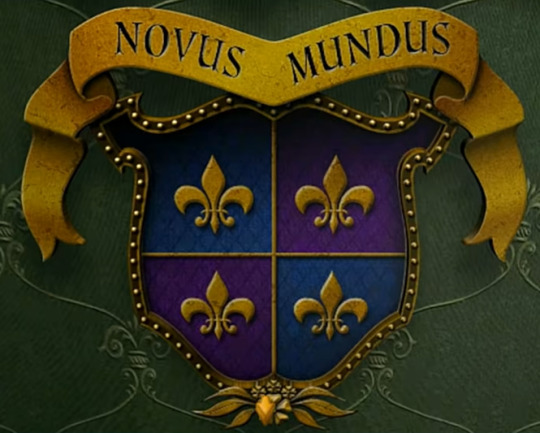
“He made a fortune in the New World and bought back most of the lands that were confiscated by Cromwell.”
Philippe's coat of arms says "NOVUS MUNDUS" which translates to "a new world".
Penelope (1714 – 1783)
Fleur de Lis; Symbol of France
Purple; Nobility and justice
Blue; Truth, loyalty

“I don't know very much about her, except that she was very loved by practically everyone in England, and there were a million poems written about her.”
“Those are mainly Penelope Penvellyn's collections of French novels. She was a patron to a raft of artists, and her salon was quite popular. She was quite the libertine, even kept her maiden name after her marriage.”
Penelope's coat of arms says "PULCHRITUDO IN OMNIA" which translates to "there is beauty in all things".
Martha (1739 – 1791)
Pegasus; Poetic genius and inspiration
Fleur de lis; Symbol of France
Lion rampant; Courage and integrity
Wheel; fortune, cycle of life
Purple; Nobility and justice
Red; Military might, warrior
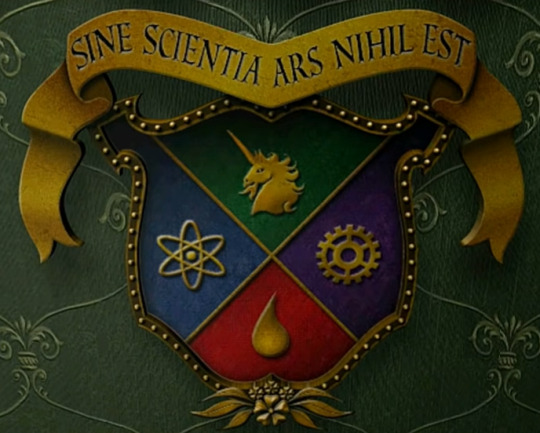
“She was completely daft - she'd wear really bizarre outfits and she was one of the first women to ride on a steam train.” (This is particularly impressive as the steam train did not exist until 10 years after her death. Oops!)
Martha's coat of arms says "SINE SCIENTIA ARS NIHIL EST" which translates to "without understanding, art is nothing".
Brigitte (1759 – 1833)
Unicorn; Extreme courage, virtue, strength.
Teardrop symbolism; “One who has endured torrents” gold means generosity or elevation of the mind.
The gear and atom are not traditional heraldic symbols but can represent progress and science.
Red; Military might, warrior
Green; Hope, joy, loyalty
Blue; Truth, loyalty
Purple; Nobility and justice

“She never married and was bonkers for astronomy; she adopted her sister's son, Richard, who later got killed at Waterloo."
Brigitte's coat of arms says "LUDI SINE GAUDIO LUDI NON SUNT" which translates to "sport without fun is not sport."
"Brigitte with her eyes so bright, looks toward heaven at midnight on the longest night of year, that's the one she holds most dear. 'Starry friends,' she's often heard to say, 'how I wish that I could make you stay.' She knows though they can't remain, time will bring them 'round again."
Only shield to have white decorations on the colored background
Star; Divine quality from above
Dove; Loving constancy and peace
Compass; Direction
Purple; Nobility and justice
Richard (1787 – 1815)
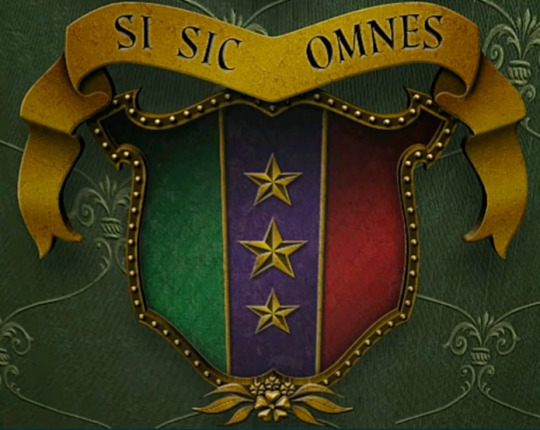
“He died in Waterloo fighting against Napoleon.”
Richard's coat of arms says "SI SIC OMNES" which translates to "if only this could last forever".
Edward (1809 – 1904)
Banner down center shield (the Pale); Military or defensive strength
Star; Divine quality from above. The specific star (nautical star) is not traditional heraldry but symbolizes finding way home.
Red; Military might, warrior
Green; Hope, joy, loyalty
Purple; Nobility and justice

“He was a big explorer and went all over the world. He wasn't very close with his son, who was also an explorer. They'd only see each other by chance in weird remote places like Samarkand or Walla Walla.”
Edward's coat of arms says "BIS VIVAT QUI BON VIVAT" which translates to "Whoever lives well lives twice".
Knight (especially on horseback); The soul guiding the body; man’s journey through life
Lightning Bolt: Swiftness and power; spiritual enlightenment.
Unicorn; Extreme courage, virtue, strength.
I dont know what the warrior with the spear and sword means
Scepter; Emblem of Justice
Green; Hope, joy, loyalty
Blue; Truth, loyalty
William (1833 – 1901)
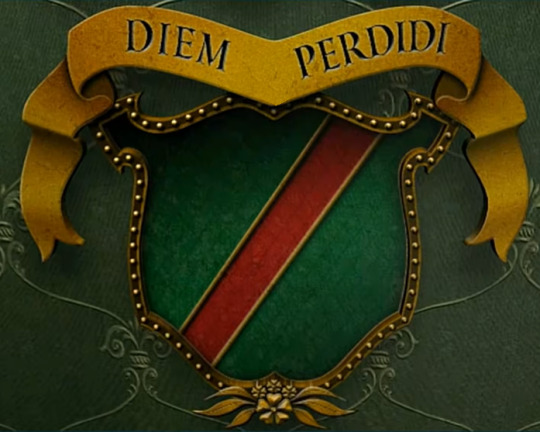
“He was an explorer, just like his father. He was kind of a whiner, so I heard.”
William's coat of arms says "DIES PERDIDI" which translates to "another day wasted".
John (1873 – 1954)
Bend Sinister (the band across the shield); Sometimes used to indicate illegitimacy. If that is the meaning here that would be very interesting and explain why he wasnt close with his father
Red; Military might, warrior
Green; Hope, joy, loyalty

“He was this huge naturalist and did a lot of exploration in the Amazon. I think there's a plant named after him. Or maybe a monkey; I forget.”
John's coat of arms says "PER AURES AD ANIMUM" which translates to "through the ears to the spirit".
Malachi (1894 – 1972)
Parrot and mouth not traditional symbols but probably represent interest in wildlife and linguistics.
Green; Hope, joy, loyalty
Blue; Truth, loyalty
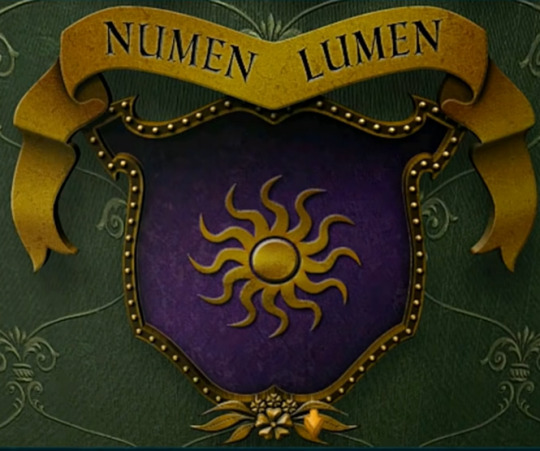
“He was a doctor of medicine and did a lot of research on icky skin diseases.”
Malachi's coat of arms says "NUMEN LUMEN" which translates to "divine light is my guide".
Alan (1923 – 1993)
Sun; Fountain of life, intelligence, innovation, creativity, enlightenment
Purple; Nobility and justice

“He was my grandfather but I didn't know him because he died when I was little. I guess he was nice.”
Alan's coat of arms says "PURGAMENTUM EXIT" which translates to "garbage out" (referencing part of a programmers' saying "garbage in, garbage out").
Serpent; Wisdom
Red; Military might, warrior
#nancy drew#curse of blackmoor manor#nancy drew: curse of blackmoor manor#nancy drew PC games#her interactive#Penvellyn family#heraldry#fandom deep dive#nancy drew games#her interactive games#this is very niche content and i will not apologize#blackmoor manor spoilers
87 notes
·
View notes
Text
If anyone gets a chance, I really encourage you to read Memory for Forgetfulness by Mahmoud Darwish which was published in 1982 about his experience during the Israeli siege on Beirut. Not only is it an enlightening read, but it goes to show very well just how not much has changed in 40+ years
67 notes
·
View notes
Text
round 3 minigame
ok so i was going to make this a minigame once matejko is out of the tournament, but since it turns out you guys love him so much... favourite matejko lets-cram-as-many-people-as-possible-into-this historical painting minigame. ft the shortest possible contextual explanations ever for those not familiar with polish history (would be longer but i'm queuing this on the evening before the elections and i need to go to sleep early) (hello, future me, i hope the elections went Not Terrible)
meet our contestants!
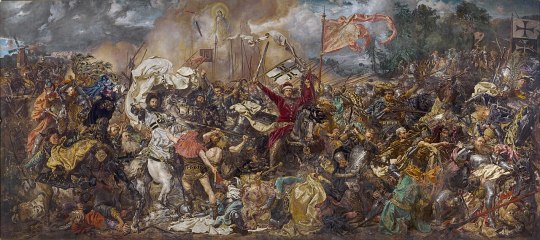

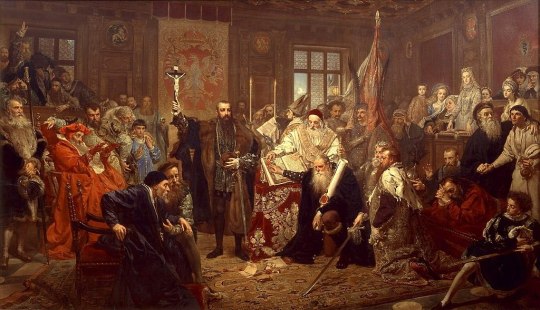
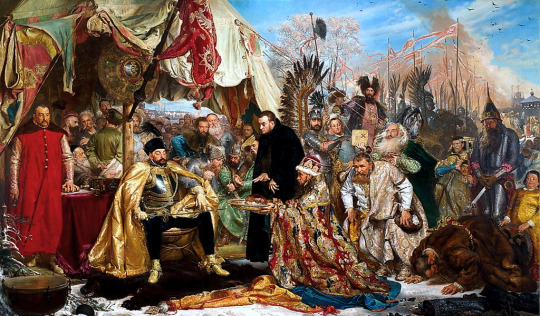
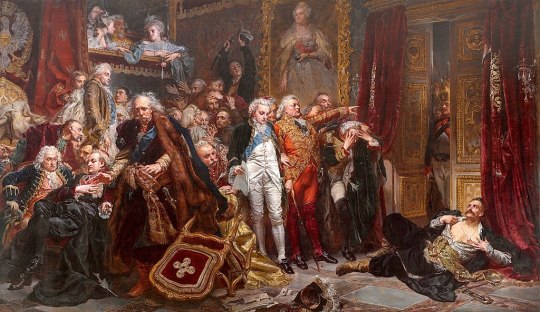
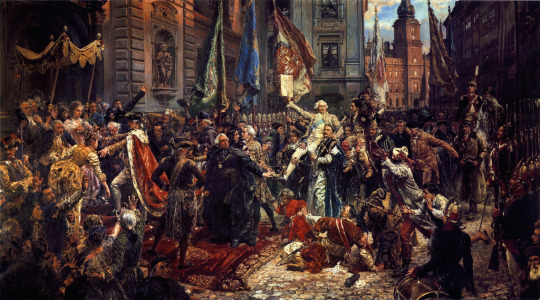
The Battle of Grunwald: so basically in 1410 Poles with their king Jagiełło and their amazing Lithuanian allies defeated the Teutonic Order in a great battle and it became super symbolically important bc wahooo victory over the Germans (remember all of these were painted while Poland was partitioned). The guy in the white cape is the grand master of the Teutonic Order, the one in red in the middle is the Lithuanian ruler prince Vytautas. i feel like im back in my 2014 hetalia days
The Prussian Homage: blah blah the Teutonic Order evolved into the state of Prussia and in 1525 they decided to become the subjects of the Polish king. Another one nicely symbolic if you live in the 19th century and want to show the middle finger to the Prussians/Germans.
The Union of Lublin: basically when Poland and Lithuania became one country (Polish-Lithuanian Commonwealth) in 1569. The guy with the cross is the king Zygmunt II August (in the round 1 minigame we had Simmler's painting of him and his dying wife Barbara Radziwiłłówna)
Bathory at Pskov: Russian forces asking the king Stefan Batory for peace during the siege of Pskov (you guessed it, this one is to show the middle finger to the Russians). ngl i dont know shit about this period in history so. go read up on it on wikipedia. King Batory is the manspreading chad in the gold cape
Rejtan (The Fall of Poland): Tadeusz Rejtan was a deputy in the Partition Sejm of 1773 (basically russia going ''heyyyyy poland and lithuania, could you pls officially agree to give away like half of ur territories to us and prussia and austria'') (fr im having 2014 hetalia flashbacks writing this) and he hated it all so much he bared his chest about it and tried to not let the other deputies out of the chamber.
Constitution of 3 May 1791: first constitution in Europe, second in the world babeyyyy. big win for the Polish enlightenment. attempt to reform the country while it was at its lowest. many cool ideas. so cool that russia, prussia and austria felt it was time to wipe the Polish-Lithuanian Commonwealth from the map :/ so sadly there wasnt enough time for the reforms to work
theres of course many more matejko paintings with a shitton of historical characters, but i think these are the most famous. have fun!
97 notes
·
View notes
Text

A full transcribe of JAVIER PEÑA'S dialogue/lines from the TV show NARCOS.
S1/E5 - THERE WILL BE A FUTURE
Includes full dialogue, and dialogue from any deleted/additional scenes available.
I've created this as a point of reference when writing for Pedro's characters, and I hope you find it useful. Even if you just want to read the dialogue. 🖤
FULL MASTERLIST OF PEDRO CHARACTERS DIALOGUE


☝🏻Dialogue has been fully transcribed by myself using reference to original scripts (if available), audio subtitles and using my own two ears. Therefore, mistakes can be made, however I have tried to be as fully accurate as I can. If you spot an obvious mistake, please kindly let me know. Where audio is not clear, I have marked with *inaudible* Scenes are separated for ease of reference.

FULL SCRIPT DIALOGUE:
First thing is that we get you out of Bogotá.
There’s an orphanage in Cumeral. It’s out of the guerrilla zone and away from the narcos.
We get you a passport. From another country, we can depose you about Escobar and the siege.
This is about keeping you alive.
(In Spanish) If Pablo Escobar finds you… he’ll kill you in a heartbeat.
__________________
Well, she’s the only witness we got that can tie Escobar to the palace massacre.
No.
Well, we keep her in hiding until things cool down, and get immunity in exchange for her testimony-
Well, the next time your wife decides to bring home a human hand grenade, how about she hands it to you?
Sleep with a communist? That would be downright un-American.
__________________
We’re almost certain. It was, uh... it was hard to tell. The… connection was bad. They were calling from Panama.
Ambassador, word is Manuel Noriega is providing safe harbour for the narcos, and possibly shipping points for their cocaine.
__________________
(In Spanish) What’s happening, Carillo?
(In Spanish) So, you practice your English with me?
Do your bosses know you’re doing this?
Well, do they have to be from Medellín?
__________________
Well, how about you, uh… clue us in?
Right. Well, good talk, Lou. Very, uh… enlightening.
__________________
You got your nails done. It’s-it’s your colour, Colleen.
It’s simple. I just need your signature… right there.
What I want you to do is sideskip a little bullshit bureaucracy and help someone stay alive. You really think I wouldn’t be asking you if it wasn't important? She’s my informant. And she could be the key to bringing down the whole Medellín cartel, so come on, Colleen, whose side are you on?
__________________
I was driving to the church. Was with my buddy, John. He was my best man. We were late. It was fucking blazing outside, 110 degrees. Whole bridal party was there sweating their balls off, I’m sure. All of a sudden, I stopped the car.
I don’t know if she actually made it to the altar.
Yeah. She forgave me. Eventually. Married a stockbroker from Dallas.
Randy… I think. Trust me, she’s better off.
He’s gonna talk.
(In Spanish) It’s about time, Navegante.
What do you got?
You said you had information. You didn’t say Gacha.
__________________
Could be money. The reward for Gacha is one million US. I’d say that’s pretty good motivation.
It’s worth taking a risk.
That’s a beautiful dress, Ambassador Noonan.
__________________
Here, Elisa’s ID.
Take her to Cumaral. My contact there agreed to hide her.
Brother, what do you suggest we do?
Look, she’s… she's important.
To us.
__________________

FULL MASTERLIST OF PEDRO CHARACTERS DIALOGUE
#pedro pascal#javier pena#javier peña#pedro pascal characters#javier pena narcos#pedro pascal character dialogue#javier pena dialogue
23 notes
·
View notes
Text
In honour of Doctor Who's 60th birthday, here are 60* things that I like about less popular** Doctor Who stories.
(*in multiple posts because I'm falling foul of the character limit)
(**IMDB rating of less than 7/10)
1. Susan is great in The Sensorites. She's at her absolute best in stories like this where she gets to be genuinely a bit alien and a bit weird.
2. "So," said someone at the BBC, "we're going to produce an allegory for different political systems, using insects. Choreographed by a mime artist. On a budget of about £2.50." The Web Planet might not entirely have succeeded, but my god, you have to love that they tried.
3. They introduced Jamie, the best companion, in The Highlanders! How is does this have less than a 7/10 rating, what is wrong with you people. It's Jamie.

4. I applaud the utter bonkersness of The Underwater Menace, and Patrick Troughton really gives it socks.
5. The Wheel in Space is proper 60s sci-fi: Servo-Robots, x-ray lasers, radio beams! I can practically smell Penguin mass-market paperbacks thinking about it. And with the introduction of Zoe, it completes my all-time favourite TARDIS team.
6. The Dominators contains the Quarks, who are adorable. They weren't supposed to be, but it doesn't matter.
7. Zoe is still relatively new to the TARDIS, but she has heaps to do in The Krotons. Nice having a female companion who's written as smart and capable.
8. We have entered the 70s, so with Colony in Space, we get Social Issues. Especially an Evil Mining Corporation, which are always fun.
9. More Social Issues in The Mutants, but this time they're paired with big sci-fi ideas. Ancient tablets! Strange life cycles! Love how much is going on here.
10. The Time Monster is like the Eurovision of Doctor Who. Deeply silly, but what would Doctor Who be without silliness? I'm sorry about Jo's coccyx too.
11. I love that they returned to Peladon in The Monster of Peladon, especially with the 50-year time jump. I'd like to see that kind of follow-up more often.
12. Is it not cool to love K9 any more? Well, I like my Doctor Who with a dose of silliness, and The Invisible Enemy delivered that. Every time traveller needs a robot dog.
13. The design of the Seers in Underworld is excellent, I love a brass dome.

14. Doctor Who doesn't have enough giant squidmonsters looming on the horizons. I'm glad the The Power of Kroll does something to address the deficit.
15. The Creature from the Pit gave us the line "a teaspoon and an open mind", and I appreciate it for that at least.
16. Romana wears one of her best of many splendid outfits in The Horns of Nimon.
17. I liked all the arch dialogue between the Doctor, Enlightenment and Persuasion in Four to Doomsday.
18. Heathrow airport is an underrated setting. I also appreciate how Time-Flight prominently features Concorde, making it far more 80s than they could ever have planned.
19. I don't intend this to be damning with faint praise (even though it probably sounds like it) but my favourite thing about Arc of Infinity is that we get a little jaunt through 80s Amsterdam. I do love a tram.
20. Babyfaced Martin Clunes doing his spoiled princeling thing in Snakedance is enjoyably disconcerting.
21. Terminus is tense and scary and bleak. Another one that I'd expected to be more highly rated.
22. Warriors of the Deep gives us a very solid base under siege. Silurians + Cold War is a winning combination.
23. Landing in a modern village doing a historical re-enactment in The Awakening is a witty touch.
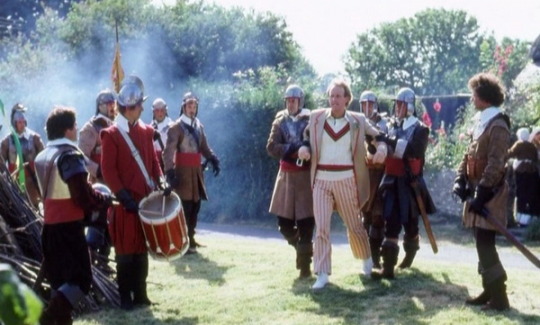
24. I can’t say I enjoyed the idea of the Doctor’s violent moods in The Twin Dilemma, but I have to commend it as a punchy way to introduce the new regeneration.
25. The Mark of the Rani should surely get some love just for introducing the Rani: camp, delightful, iconic.
26. Herbert turning out to be HG Wells in Timelash is a lovely twist and handled well.
27. The Trial of a Time Lord is so grand and ambitious. If the show hadn't been struggling in general at this point, it would be among the all-time greats.
28. With its colour-coded gangs and faux-urban slang, Paradise Towers is gloriously of its time in a way that currently feels quite naff, but that I suspect will be fascinating to revisit in about 30 years.
29. Delta and the Bannermen is action-packed and has one of the best titles in 80s Who.
30. Possibly the most terrifying moment in all of Doctor Who is Kane's face melting in Dragonfire. This series is nothing if it doesn't send children running for safety behind the sofa.
31. Got to love it when Who gets aggressively anti-Thatcher, and they never did it more than in The Happiness Patrol.
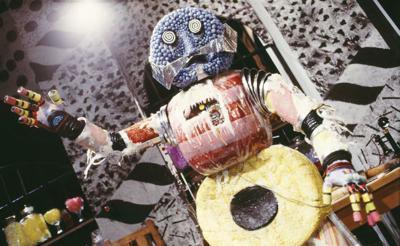
37 notes
·
View notes
Text

Star Wars: High Republic #7 (2023)
Battle for the forcé
Chapter two: The siege of enlightenment
Marvel
#Star Wars High Republic#Star Wars#High Republic#The siege of enlightenment#comics#comic books#comic covers#scifi#sci-fi#science fiction#Cavan Scott#andrea broccardo#Marika Cresta#mark morales#Frank William
2 notes
·
View notes
Text
"International institutions, promoted as fair and designed to serve all, were in fact racist vehicles of oppression and control. Colonialism had never gone away; it is simply cloaked in a different cloth. The uninformed talking heads on Western news programmes, the nonsensical UN debates, and hypocritical Western government officials once again lectured us, trying to mislead us into thinking the world was made up of the civilised and the uncivilised, the enlightened and the brutes. There is light, and that is where they live, and there is darkness, where others merely exist. This twisted colonial logic is what gives birth to Whiteness, with all its rights, protection, and recourse. Whiteness is by its very nature exclusive and operates on exceptionalism. It feeds on oppression and violence, someone must suffer for it to function, and that someone can have no entitlements, otherwise Whiteness doesn’t work.
So, Western governments enabled and encouraged their single largest militia outpost, 'Israel,' to bomb, brutalise, butcher, and besiege Gaza. But on April 15th a few thousand brave people turned the tables and lay siege to thirty cities around the world. Gaza, colonialism’s open wound, was striking back. And the irony was on view for all to see."
17 notes
·
View notes
Text
Zlatá Malina (Golden Raspberry), pt. 5
Siege and Storm- Chapter 6

What's he angry for? That they won't get to disappear again?! That they won't get to live their boring anonymous life, where he's thriving doing anything and Alina's slowly dying, but reliant only on him?!

I don't see how is the Darkling's morality relevant to depth of his knowledge, but go ahead, Malyen, enlighten me!

Why? Because he was in the same room as your property girlfriend, when you didn't have eyes on her?!
Not only Malyen's unreasonably jealous- blaming Alina for situations she had no power over- but his faith in her feelings for him, her faithfulness is staggering.
(His dick ~that~ tiny?!)

He's right- you don't have the Darkling to point you in the correct direction...

What's his point here?
Because jealousy doesn't make sense even for Malyen.
Is it just fear of her becoming more than a grey mouse reliant on him?

Like yeah, but he never seemed particularly exited about her light, so it falls a bit flat...
pt. 1, pt. 2, pt. 3, pt. 4, pt. 6, pt. 7, pt. 8, tag for all icluding the rest
#Grishaverse#Siege and Storm#S&S Chapter 6#Alina Starkov#Malyen Oretsev#Zlatá malina#grishanalyticritical#V#Grisha trilogy#books#quotes#Leigh Bardugo#anti Malina#anti Mal
34 notes
·
View notes
Text
Sulk — d / rogier oneshot
tw / cw: rotting, death, mental illness, body horror
Perhaps the thorns had become enchanted with him long before he stood, aloof, mesmerized by the visage of the crass, sickly mockery of the spore princeling. He can still recant it, the memory as fresh as the sores upon his withering, corroding skin; the memory, the terror of his graceless eyes laying siege to the inflated corpse. The brewing stench of death, the scent of pure decay, feverish and captivating, alluring in its neutral, abject horror. He remembers, so dearly, pulling his gloves off, perhaps in a state of enlightened delusion, and caressing the leather-bound surface of the beast. Oh, how his flesh crooned at the feel of the canvas, lethargic skin, flies buzzing within him in anticipation. His eyes had been filled with a beautiful omen, horror blooming into a graphic adoration as he had witnessed his own body (how could it be?) be impaled by branches, a garden of blood brooding upon his bosom, dripping down, past his quivering feet, which, dangled cryptically beneath him. He hadn’t the time to scream. Perhaps, he would’ve if the thorns had not nestled themselves so deeply, becoming woven into his very being, finding themselves home in him, from his diaphragm to his liver, all of it became a shelter for the scared, little branches in his body. Oh, how wonderful it had been. Yes, he was no stranger to death; as it always went, all Tarnished had and will die. It was an overarching destiny; comforting in its cyclical malice— something about dying, enveloped in a warm death was so much more, however. In those special moments, he had felt superimposed, thrust through his expansive mind into a static state of staunch hysteria. For once, perhaps, he had felt a harrowing ecstasy. Important. Beloved. Dead. What an intoxicating dizzy it had been. If one were to peer into his mind to grasp at such heretical thoughts perhaps they might’ve been afraid; but he was not entranced by such a feeling (fear was a notion for those who are alive. He could not stand the grim association). When had the thorns nestled within him, he wonders, idly. He used to fear. Used to scream and cry and rally against this world. Death, he recants, was once a blasphemous horror to not dance with. What was it that arrogant, brooding boy had said? He could not recall past the fog of beloved nothing that has descended upon his crescendoing, frivolous mind. Likely, he, that arrogant, brooding boy, had warned him, trying to harrow him away from the luscious state of abyss— of true death. It makes him smile, wistful and a bit cruel, at the thought of that boy shepherding him from his perfect end. He probably thought he was strong, he found himself thinking, stronger than anyone (stronger than us, stronger than me). Strong, was he? He finds himself chuckling boyishly at such a whimsical, arrogant thought. Strength was determined by bravery. That arrogant, brooding boy was anything but brave. Hiding behind the Order, behind his armour, behind him, turning away from death, disgusted. How piteous, indeed. Death shall bloom, regardless of the beauty of life and there is little reason to fear it. To fear death is to cower and cowards are weak. Isn’t that right, he whispered, conspiringly, to his legs, covered in darkened brambles of decay. Long since has he lost feeling in such strong, brave legs; now, they sat, paling from disuse and dimming from death. He was rotting, good and well. The thought makes him shudder with a brewing, daft nausea. How deep that inquisitive curse scoured his body, infecting his graceless form with pure, heavy death. He lets out a caustic, rumbling breath, a maelstrom of dreary rot intermingling salaciously with the oxygen amidst his lungs. He imagined another tooth would likely fall out tonight if that wretched scent pooling from beneath his own nose was any indication. The state of himself, the wizened spellblade he was, brought no placid joy to his tearing mind. His delicate face shifts into an offended sneer at the thought. “Was this what you wanted? Would this satisfy you?” (You coward).
His heart flutters with a bitter grief, the invasive feeling batting itself against his ribcage like a horde of drunken, pale moths. His thoughts sink into a familiar image of that sullen, blank mask and he imagines, detestably, the smear of arrogant triumph that would’ve been upon those lying, lacklustre lips. Oh, how blankly the (his, once) golden knight would’ve gloried amidst such a worthless victory. How dead his eyes would’ve been, if he could only see him now. Dead as the legs that lay beneath his singed waist, emboldened by a burning, dismal empty. He closes his eyes and breathes (breathes all those lonely thorns deep into the enclosure of his wizened body, to let them bloom amidst his strange, carnivorous hatred), slow, attempting to angle his mind with thoughts of the world he could barely see, eyes hardly (cowardly) filling his skull. Such a waste it would be, he mused, bothering his contemptuous mind with harrowing thoughts of that belittling, brooding boy. His closed eyes turn restful, eventually, and he allows himself the idle mercy of nothing, gleaming into a slumber that would, one day, come to pass. Beautiful. (So lonely).
He does not know I (we) watch him. It has been (and will be) a long eternity since we have been united, he and I (the sun and the parasites that feed from it) and I intend, valiantly (cowardly), to keep it as such. It is a piteous state he is in, I observe, quietly, with little malice; his slumber is laboured, gentle brows furrowed in a shrill horror, mouth rumbling with words I shan’t hear, eyes darting beneath their heavy, darkened lids, as if gleaming something corrupted I shall never dream upon. He is deep within a nightmare, I’ve gathered (and I shall do nothing to stop it. This is what you’ve done, to yourself. Didn’t I tell you? Would you have listened had I begged? Is it my fault?); I reach out a parenthetical palm of glimmering gold, radiant in its hue but muted in nature, in my nature, I suppose. I find my covered hand upon his cheek and the cold metal does little to soothe the fallowing litany of repentance (suffering) that befalls the spellblade. The thumb (our thumb) rubs into the disgruntled flesh and I observe, quietly, how strands of skin begin to sliver off, sloughing off with little resistance, as if flowing with little viscosity off his beatific frame. I dig my thumb in a bit harder, drawing darkened, gothic blood from the poor sod. I shush his murmurs with little avail, my revering words of shunned remembrance doing little to comfort the dark he had forced himself into. I attempt to deter the acute misery piling up within my stomach, like funeral stones, with a lullaby of regurgitated, aggravating prayer. Deliver his spirit, I whisper, conspiringly, to a ruler that shan’t hear my selfish words. For he, the poor sod before me, is undeserving of such little, effortless mercy. (I wish we were worthy, all of us. I wish, so quietly, as not to disturb anyone, particularly myself with such a thought, that we had been worthy. That the erdtree had accepted one, if not many. Perhaps then I would not be delighted to watch my slouching, former lover die before me). I pull my hand from his face. The reviled, ghastly dripping of somber red pours, slow, out of his body and I watch, idly mesmerized, by the destruction before me. He is, as beautiful as the day he left me, I note, to myself (not to us). I pull my hand toward my own face. I peel my golden skin from my head, revealing an omen to the world dressed in human skin, shaped to a haunting, abyssal expression, eyes blended to no colour. I tuck my helm beneath one of my arms and with the other I cradle the wound I made, lamenting it, traitorously. For little time do I exercise my gateway right to blasphemy; instead, I lean closer, the stench of death tickling at my cleanly (disheveled) chin, and I deliver a weary kiss above the small wound I have marred his sun-kissed face with. I back away. I linger. I watch him. (We, once). He sits, curse-ridden body wedged between the gears of empty unconscious and I can do nothing but watch. I cannot steel my heart, or perhaps melt it, to speak with him; so instead, I shall watch and I shall linger and I shall lament. As before me sits Rogier, my deepest failure. The one whom I have killed with my thankless, unconvincing, overpowering faith. I step on one of the many staunch, barbed branches that have sprouted from Rogier’s legs, the accursed nature beginning to bloom far past what was correct. I feel a decisive disgust drag along the pits of my stomach. Had I been more convincing. Had I been more humane. Had I been more like him, perhaps, Rogier would not be sat before me, a mockery of the wise, glamoured sorcerer he once was. What a cruel joke, this all was. I have worked so tirelessly to corrupt the spread of death, only to have it sprout from him, who is, yet, me. I shake my head, the thoughts beginning to dizzy my mind lasciviously. Oh, my once friend, rotting amidst your own accursed blood. Would it be a mercy to you, I wonder, if I had killed you? All those years ago? When we met… the memory gives way to a convicted, convoluted fondness that I shan’t emote upon my inhumane flesh.
My face remains as it always has: blank. For I am no mortal man. My mortality is measured by my capacity to be amidst the living; my patient breaths indicate no soul to be present. (Perhaps he, who makes us, took all the scornful feelings I had once felt, long before I reunited with the Clergyman. For what else could it be but I reuniting? I knew him, my destiny, long before I had been born, perhaps. Such a delusion, to comfort us, perhaps.) I had long since sloughed sensitivity from my senseless form and have embraced my will as a blade for the utilization of the derangement, estranged, beautiful Order; I am it and it was always I and I shall not (cannot) think past my own fixation with it, for that is what love had been, for us. Yes, we loved so deeply, didn’t we? He and I and I again. The Order had been our eclipse and we could do nothing but curl like infants beneath its blackened radiance. Destined, it was. A comfort, it would always be. (A shield, it would have to be. I could not face him; never properly. Rogier, whom I had loved. Was my love true? Was I alive? My sentience was a yearning curse and with its belated awakening had I loved Rogier. With an everlasting passion that would scour my mind and braid it with flowers of heresy. When I look at Rogier, I guilt and agonize over my fetid ignorance. For my love, surely, had cursed him too.) I am his; his persecution and surely I must… I place my Midas-touched, severed head onto the floor (I note with apathy how the thorns dance towards it) and I unsheathe my blade, the twins, inseparable. My blade, refracting against my being, shines with something wretched and I cannot bare the stench of the fickle kills that are marred into its united metals. I point my blade to his neck (I wish it was mine) and I stare, blankly, as I always will. Stoicism has been lured into my careening halfling-soul and I shan’t abandon it for it is I and I am me. It is too late for him. (Why can’t I do it? Why is my body frozen, as thorns have begun to wither amidst my iron-clad shoes? I stare, deeply, imposingly, at utter failure, my repentance and my mistake and I sting, the pain fresh along the lining of my stomach. Why can’t I move? Why do I shake? This is my possessive destiny. To slew that which has been corrupted by a stasis beyond our understanding; this is Destined and I am, at that moment, his galactic destiny. Move, I implore my body, shivering. I cannot shift my face to sorrow, even, the sinews of my flesh-ridden iron skull locking in place, cogs of muscles rusted and disused. I cannot feel anything. I cannot feel anything.) I, innocuously, stare at his face; he almost appears peaceful, face no longer scrunched in a gritty state of delirium. Now, his face is smooth and he is breathing softly, incredulously docile in spite of the blade pointed at him, as if my will was a mockery to him, as if I was no threat to someone as gallant as him. My face quivers, lip jutting slightly. The tip of my blade kisses his skin, it’s sharp valour caressing his warm flesh with a viscous silence. A sliver of blood. A small hole in his neck. His skin, so fragile, half rotted, already. He is dead (why can’t I do it?). In an empty of breath of his, I could almost make out the sound of my name (Darian, not D) and in my head, I scream.
In the end, I was weak. I gingerly wipe the sweat that trailed like streaks of rain down his furrowed brow, thanklessly, a sacrilegious smile burrowing into my expression, like a cluster of festering worms, my lips straining despite the barren visibility of my odd expression. Such a scene was nostalgic for me; I was the eldest of two, thunderous twins; bitter as dirt after a flood; and I was conditioned to nurture and I was conditioned to protect (I was conditioned to kill). Many times had he (I) fallen ill and I (he) would be the stark glimmer amidst a sandstorm of gaunt fog; I would take gentle care of him, D, and he, the twins, would cry, quietly, hushed words dying behind his stitched lips. I had decided to take him, my wilting old friend, to be bathed. His slumber was a reckoning I could not consult with; for no matter what I did, he would not wake (I was grateful, if only slightly. He would not have to look at me, in overabundant disgust, pondering why I had bothered with him). I washed his clothes, hung them up to dry, and I wondered, silently, where his sword had gone. I did not dare press too roughly against him, for fear he would shatter in my ironclad grip and scatter amidst the Liurnian winds. It is cold and it is an early morning and I’ve warmed the naturalistic water using an idle spell, my hands alight with a fledgling fire; my prowling faith diluting, enough for my spell to be a plausible temperature catalyst in the water. I had a bit of soap and little courage to divulge and enough guilt to compel me (to attempt to rid him of the filth that marred him and his radiant skin). My face quivers, distorted as the water my hands waded through (he still smells of it). I do not cry. I do not cry. I could not stomach a single tear, I believe, steadfast. The consecrated spell dies in my grip and I find my hands weaving into threads of lacklustre hair, idle clumps of a heady brown knitting themselves in my grip and pouring into the water. My stomach churns. I stare at him. He does not stare back. After a few more tense moments, I fish him from the water and do not submerge him into such a subversive luxury; instead, I pull my harmonious armour off my body and I separate my distended cape from the metal. I begin to dry him off, gently, conscientious of the disturbance I was both to him and to his life. I did not want him to see him; I feared him leering at my skin. I feared the possibility of him hooking me with a milky glint, eyes rotted in his skull, melting between his cantankerous cartilage. When he is dry, I clothe him, thanklessly, filled with a roasting, festering guilt; one that creates fingerprints of venerable sorrow in my skin, along my spine. I cradle him in my grip and he, subconsciously, curls closer to me. I do not cry. I… I do not cry.
He does not comprehend much when he reawakens, eyes blurry and still saturated with a grotesque sleep, deathly, daft slumber crumbling between his eyelashes. His head is exceedingly empty and he cannot justify the heat that radiates from his mind, the center of his forehead boiling with a sickly warmth, diluting his thoughts and bleeding the emotions right from his head. His mouth feels dry but he does not cry; not in alarm nor in agony. It feels like his eyes were attempting to crawl out of his spiralling head.
#elden ring#elden ring rogier#sorcerer rogier#rogier#spellbladerogier#d elden ring#darian elden ring#darian#elden ring fanfic#oneshot#darian / rogier#d / rogier#d x rogier#darian x rogier#wip#current wip
24 notes
·
View notes
Text
The Stuff I Read in December 2023
favourites in bold
Books
Calling a Wolf a Wolf, Kaveh Akbar
The German Ideology, Marx & Engels
The Dark Forest, Cixin Liu
Yuri/GL
Hanamonogatari, schwinn
The Moon on a Rainy Night / Amayo no Tsuki (Vols 1-2), Kuzushiro
Run Away With Me, Girl, Battan
Opium, Aji
Asashi to Satsuki, Fujita
The Guy She Was Interested in Wasn't a Guy At All / Ki ni Natteru Hito ga Otoko Janakatta, Sumiko Arai
Free Soul, Ebine Yamaji
Short Fiction
Yon & Mu, Junji Ito
A Day in the Life of Anmar 20X1, Abdulla Moaswes [strange horizons]
Muneera and the Moon, Sonia Sulaiman [fiyah]
The Center of the Universe, Nadia Shammas [strange horizons]
Honeydew Toxicity Event, Porpentine Charity Heartscape [link]
Palestine
Palestinian Anarchists in Conversation: Recalibrating Anarchism in a Colonized Country, Joshua Stephens [link]
Anarchist, Liberal, and Authoritarian Enlightenments: Notes From the Arab Spring, Mohammed Bamyeh [link]
Our Siege is Long, Esmat Elhalaby [link]
Anti-Zionism as Decolonisation, Lara Kilani & Leila Shomali [link]
What's the matter with the Israeli working class?, Daphna Thier [link]
Inside the Pro-Israel Information War, Lee Fang & Jack Poulson [link]
Refusing Genocide, Rasha Abdulhadi & Beatrice Adler-Bolton [link]
‘A mass assassination factory’: Inside Israel’s calculated bombing of Gaza, Yuval Abraham [link]
"Theory"
Western Marxism, the Fetish for Defeat, and Christian Culture, Jones Manoel [red sails]
On Contradiction, Mao Tse-Tung [marxists dot org]
The Work of Art in the Age of Mechanical Reproduction, Walter Benjamin
Other
Multimodal datasets: misogyny, pornography, and malignant stereotypes, Abebe Birhane, Vinay Uday Prabhu, Emmanuel Kahembwe [arxiv]
On Anthony Bourdain, Lz. A. [red sails]
The Myth of Man the Hunter: Women’s contribution to the hunt across ethnographic contexts, Abigail Anderson et al. [doi]
Monster, Terrorist, Fag: The War on Terrorism and the Production of Docile Patriots, Jasbir K. Puar & Amit Rai [link]
Deaths Pulled From the Future, Beatrice Adler-Bolton [link]
In The End We All Do What We Must: Universal Paperclips, Clicker Games, AI, and Agency, Sam Keeper [link]
7 notes
·
View notes